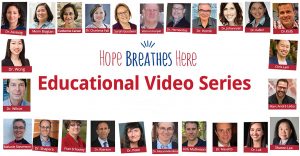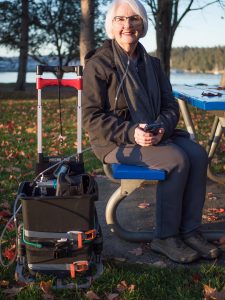Message from CPFF Board Chair, Kirk Morrison

Kudos to Kirk Mathison for a great Calgary Support Group meeting on December 1! More than 50 people connected virtually through Zoom, and Dr. Amanda Grant-Orser, a Robert Davidson Fellowship recipient, gave us an extremely interesting presentation on Genetics and ILD. In addition, Dr. Charlene Fell addressed recent media reports about COVID-19 impacting the availability of oxygen for our Southern Alberta PF Community. It was a practical update that alleviated a lot of concerns. Finally, we had a comprehensive questions and answers session where Kirk, Charlene and Amanda fielded questions from the meeting participants.
I’ve attended a number of Kirk’s meetings in the past, and they have all been well organized, topical, and with great attendance from an engaged group. So what prompted me to talk about this one in our national newsletter? Well, my Dad and I attended this one together online, and it had a really positive impact on him that I wanted to share with all of you.
You might recall that my Mom passed away from IPF earlier this year. My Dad has continued to live alone in their house in the Niagara region, and while he is physically able enough to look after himself, after nearly nine months of living in the middle of a pandemic without his partner of nearly 65 years, he is more than a little down. However, attending the Calgary Support Group meeting was a “real shot in the arm” for him. He was interested in Amanda’s presentation, and because he looked after Mom’s oxygen, got really engaged with the discussion following Charlene’s update. Although he isn’t particularly computer savvy, he found it motivating to see people like him using technology to connect. However, most importantly, it was simply reassuring for him to hear from people across the country who share similar issues and concerns.
I took on the CPFF leadership role from Robert Davidson nearly three years ago, and since then I’ve constantly asked myself if we are making a difference for the PF community. Based on my Dad’s reaction, I felt good about things after this virtual support group meeting.
Thanks for everyone’s support and engagement during a year that we’ll remember forever. Continue to take care of yourselves, your loved ones and your community, and all the best to you and your families over the holidays. I look forward to working with you in 2021!
Kirk Morrison
CPFF Board Chair
A holiday season like no other
A message from Sharon Lee, CPFF Executive Director

It’s been a long nine months, and although a vaccine is on the horizon, we’re still all coping with the spectre of COVID-19. It is likely we will need to remain vigilant for a few months to come.
This holiday season will mean in-person celebrations will be limited to those in our households, or if you live alone, perhaps a special friend or two. Yet, we hope you will find some joy in the holiday season and through the dark winter days ahead.
Take a drive to see the holiday light displays in your community. Some are better than ever, trying to make up for cancelled public events during the year. Decorate your home as usual. Play holiday music. Attend a religious service online.
Catch up with your friends and family online, or by phone. Nothing beats a good conversation. Avoid COVID talk. Discuss books you’ve read, TV shows you’ve enjoyed, interesting newspaper articles, funny things your children or pets have done lately, or share some jokes.
Order and send gifts online. No need to go to the post office, have them sent directly to the recipient. Or, if you’ve baked goodies for others, see if a neighbour will deliver or mail them for you. Send Christmas cards again. It’s lovely to get real mail at this time of year. Don’t forget those more restricted than yourself. Reach out by phone or mail to brighten someone else’s day. It will make yours shine too.
Cook a lovely holiday feast, or order a meal in advance from your favorite restaurant, if it’s open, even if it’s just for you. Eat with others via Zoom, or using another digital meeting application. Or have everyone put their phone on speaker and be a part of the dinner conversation.
If you’re part of a CPFF support group, take part in virtual meetings, or reach out to individual members for support, comfort or information. Check out the article below about new CPFF resources online, including a series of 16 webinars from Awareness Month now being posted on our website. They are full of information from experts across the country about a variety of topics related to pulmonary fibrosis. We’re also interested in your ideas for topics you’d like to see covered at next fall’s Awareness Month forums.
For inspiration, check out the Wrap up and Applause video, full of tributes and images and messages from Awareness Month activities.
Our next newsletter will be coming out in early February, but we’ll be in touch if there is any relevant news before then. February 28 is Rare Disease Day, in Canada and around the world. It is an opportunity to raise awareness for rare diseases like pulmonary fibrosis and to advocate for improved access to treatment for people with rare diseases and their families. Please reach out to me at [email protected] if you are interested in sharing your story for this awareness and advocacy initiative.
This is our last issue of Hope Breathes Here for 2020. And December 31, 2020, is the last day your donation will qualify for a 2020 tax receipt. CPFF receives no government funding, so your donation is critical for us to keep sharing credible information with you, to provide support services and to invest in research. I hope you are able to help the CPFF community this year.
I wish you all the gift of hope and joy in this holiday season like no other and may 2021 see us all embrace our loved ones once again and meet one another in person. I look forward to it.
Sharon Lee
CPFF Executive Director
Two CPFF research grants awarded

The Canadian Pulmonary Fibrosis Foundation is pleased to announce two, $20,000 research grants for 2020-2021 to Dr. Ciaran Scallan at the Firestone Institute for Respiratory Health in Hamilton, Ontario and Dr. Lee Fidler of Sunnybrook Health Sciences Centre in Toronto.
“We received 10 applications for our research grants this year,” reports Sharon Lee, CPFF’s Executive Director. “With members of our Medical Advisory Board (MAB) dealing with increased demands during the pandemic, we are very grateful that our volunteer MAB experts were able to review and recommend these research grants and our volunteer Board members were able to approve them before the end of this year.”
Dr. Scallan and his co-primary investigators Dr. Terence Ho and Dr. Imran Satia (all assistant professors at McMaster University) will be studying the feasibility of using a sputum (phlegm) guided approach to treat chronic cough in PF patients using inhaled corticosteroids and azithromycin (a macrolide antibiotic) during a 12-week period.
Chronic cough is a very common PF symptom, occurring in more than 80 per cent of patients, and has a major impact on physical activity, social participation, and overall quality of life.
“There are likely multiple overlapping mechanisms contributing to cough in PF,” says Dr. Scallan, “and most treatment options used today only modestly improve this symptom. In this study, we’ll analyze sputum samples to identify and characterize inflammation in the airways to direct specific treatment of PF associated chronic cough, similar to other respiratory diseases, including asthma and types of bronchitis.”
Study participants will be randomized to either a “sputum guided approach to cough management” group, or a “traditional approach to management” group. Results from each group will then be compared.
“We are extremely grateful to the CPFF for funding this research project allowing us to explore a novel and personalized approach to the management of a symptom that is a significant burden for many individuals,” says Dr. Scallan. “This study is an example of how collaboration across different areas of expertise can provide an opportunity to improve the quality of life of those living with PF.”
Dr. Lee Fidler and his co-principal investigator scientist Dr. Andrea Gershon of ICES will be investigating the incidence and prevalence of rheumatoid arthritis interstitial lung disease (RA-ILD) in Ontario.
Rheumatoid arthritis (RA) is the most common autoimmune disease affecting the skeletal system. Although it is widely recognized for its impact on the joints, RA can involve the lungs, with up to 20 per cent of patients developing lung scarring. The development of RA-ILD negatively impacts survival, with a two to three times higher mortality in patients with ILD compared to those without. As of 2010, nearly 100,000 Ontarians were living with RA, however, the burden of RA-ILD and its impact on health outcomes in Ontario is unknown. Understanding risk factors and health impacts of RA-ILD is critical for guiding disease monitoring and to inform patients.
While the primary objective of this research is to estimate the incidence and prevalence of RA-ILD in Ontario, secondary objectives include determining the impact of RA-ILD on the health care system and mortality, as well as assessing the impact of disease modifying treatments for RA on the development of pulmonary fibrosis.
“We believe this research will have a significant impact on our understanding of RA-ILD, as it will be the first study using health services data to describe the epidemiology of RA-ILD in Canada, “ says Dr. Fidler. “Estimating disease trends, prescribed treatments and patient outcomes will provide insights into current gaps in disease management.”
“Thank you, to the Canadian Pulmonary Fibrosis Foundation for supporting our research,” adds Dr. Fidler. “This means so much to early career investigators like myself. I hope this research will provide valuable information for both patients struggling with RA-ILD and the health care professionals who support them.”
CPFF’s Medical Advisory Board (MAB), established in 2017, examines grant requests received from the research community and determines the recipients. They perform this service for CPFF as volunteers. This group is comprised of eight of Canada’s most highly respected respirologists, pulmonary fibrosis specialists and researchers and helps ensure your donations for research are allocated wisely.
“The application and review process is rigorous,” says MAB Chair Dr. Charlene Fell, Director of the University of Calgary Interstitial Lung Disease Program, “conforming to standards at other research granting organizations.” MAB members are recused from reviewing applications from their own medical or academic institutions. You can read more about the research application process and eligibility criteria in the research section of our website at www.cpff.ca.
CPFF research grants are one-year grants of $20,000 each, which can be used to support clinical and/or translational research in interstitial lung disease. The proposed research project must have approval from the principle investigator’s institutional ethics review board. The principal investigator/applicant for a research grant must be either a physician, scientist or healthcare professional with an academic appointment and therefore eligible to apply for her/his own research grants as an independent investigator.
CPFF receives no government funding and individual donations are critical to investing in research projects such as the ones described in this article. Consider making a donation today to support CPFF’s research initiatives.
Awareness Month education webinars now online!

For the latest credible and useful information about pulmonary fibrosis (PF), check out our series of education webinars, now being posted online. Recorded during our Hope Breathes Here awareness campaign in September, the 16 sessions feature presentations from 25 of Canada’s leading PF experts and include the question and answer sessions from the live, virtual audience. Sessions will be posted to the website during the coming weeks, so check back often to see what’s been added.
If you missed them live, you’ll now be able to watch them whenever you want. Or, maybe you’ll want to see some of them again. And please, share them with anyone you think may be interested in learning more about PF, perhaps even your family physician or members of your health care team.
If you feel the need for some touching stories and inspiration, the Hope Breathes Here Wrap-up and Applause video, first broadcast on Saturday, October 3, is also now online. It features tributes to people living and passed submitted by their families, as well as other inspirational messages and images from Awareness Month activities. It’s a true tribute to the PF Community.
CPFF is grateful to its sponsors, who provided support to bring you this year’s virtual Pulmonary Fibrosis Awareness Month events and activities. They are: Boehringer Ingelheim (Canada) Inc., Hoffmann-LaRoche Ltd., Repeat Dx, Respiratory Homecare Solutions, Snapd, Telford Land & Valuation Inc. and TELUS.
CPFF receives no government funding, so donations from individuals are vital for us to continue our work for the PF Community in Canada, providing support and education, as well as funding research and advocacy efforts. Please consider making a donation today.
And coming in January
Beginning at 6 p.m. EST on January 20, 2021, Dr. Shane Shapera and Dr. Shaf Kesharjee will present a webinar called: “Therapies for IPF – From Pills to Lung Transplantation.” Dr. Shapera is the Director, ILD Program at Toronto General Hospital and Dr. Kesharjee is the Director of the Toronto Lung Transplant Program. Further details on how to access the webinar will be posted on the Events section of the CPFF website as soon as they are available. Or follow us on Facebook and Twitter to keep informed.
Expert webinar on systemic scleroderma interstitial lung disease (SSc-ILD)

If you are living with systemic scleroderma and are experiencing lung involvement, you need to watch Dr. Shane Shapera’s webinar on SSc-ILD. In plain language, with understandable graphics and just the right touch of humour, this webinar explains relevant medical terminology, summarizes key research studies, and outlines various treatment options for SSc-ILD.
First delivered live online in late September as part of a series of webinars during Pulmonary Fibrosis Awareness Month, this webinar also includes a question and answer session with the audience.
An autoimmune condition, systemic scleroderma (SSc) is a type of scleroderma which goes beyond changes to the skin, muscles and blood vessels and impacts internal organs. In the case of SSc-ILD, the lungs are affected causing interstitial lung disease, the chronic, progressive scarring of the scaffolding of the lungs, resulting in a continuous loss of lung function.
Up to half of people living with SSc will develop ILD, but each of them will have different experiences, with some having mild, stable ILD, and others developing severe, progressive ILD. How do we predict who will have mild disease and who will progress over time?
Dr. Shapera outlines five risk factors for those most likely to develop a severe, progressing form of ILD. These include:
- A recent diagnosis – within four to five years
- A specific antibody profile
- A high volume of abnormal lung (greater than 20 per cent)
- Low lung function at baseline with forced vital capacity (FVC) less than 70 per cent
- Declining lung function with FVC dropping more than 10 per cent within six to 12 months.
Basic care for everyone with suspected SSc-ILD includes screening and treating for other causes of coughing and breathlessness. For those with SSc-ILD, pulmonary rehab programs, where available, are helpful and vaccination for influenza and pneumonia are also recommended.
There are a number of drug treatments available for SSc-ILD, including three which work by suppressing the immune response: Cyclophosphamide (Cytoxan); Mycophenolate (Cellcept / Myfortic); and Rituximab (Rituxan). The anti-fibrotic medication Nintedanib (Ofev) was approved a year ago by Health Canada to treat SSc-ILD.
This last medication is a game-changer, reports Dr. Shapera, reducing the progress of the ILD by almost 50 percent. While it is approved for use in Canada, it costs more than $30,000 per year and is not yet covered by provincial health plans. The medication is covered for those with idiopathic pulmonary fibrosis IPF and the Canadian Pulmonary Fibrosis Foundation is advocating now for coverage for the medication for all who will benefit.
“Overall, there has been great progress in the treatment of SSc-ILD in the last few years,” says Dr. Shapera, “giving us great hope for the future to improve the quality of life and life span for those living with SSc-ILD.”
Learn all you can and be a strong advocate for your health

Like so many others, it took far too long for Martha Hardy to receive a diagnosis of pulmonary fibrosis (PF). In her case, it took four years before she was diagnosed with hypersensitivity pneumonitis.
It’s hard to pinpoint when Martha first began having PF symptoms. For many years she had a chest infection every winter. Martha had experienced shortness of breath when walking inclines since about 2006. In 2012 while vacationing in Arizona, her friend noticed that she was coughing, quite badly, every morning. “I hadn’t really noticed, until she mentioned it,” says Martha. “Once I was up and about and showered, I was fine.” As time progressed, other friends started to notice my dry cough during the day.
She did talk to her doctor about the cough and shortness of breath and was diagnosed with asthma. “For the next four years, I tried many inhalers with little or no noticeable benefit.” A chest x-ray showed some irregularities at the bottom of her lungs, but when she asked her family physician about having a chest CT, he didn’t think it was necessary.
Shortly before undergoing gall bladder surgery in 2015, Martha began having short, sharp chest pains. This was addressed with her family physician and she also went to her local hospital, where they kept asking if she had fallen and hit her head. Although she insisted she had not, they still did a CT scan of her head and did a stress test to check her heart. Both these tests revealed nothing abnormal.
“They didn’t seem to believe me that I had these sharp, intense, short episodes of pain,” says Martha. They asked whether she was anxious about her upcoming surgery. As a former registered nurse and retired health care manager, she was not worried about the surgery.
In early May of 2016, a chest CT was ordered and a referral to a respirologist was made by a locum physician. An appointment was scheduled for mid-September 2016 for the CT and a request for the specialist appointment following that test. With this long wait, Martha continued with her cross-Canada trip plans for the summer.
Despite the continuing cough and an increasing feeling of tiredness, Martha left in May 2016 for a road trip in her 24-year-old RV headed to PEI where she was born and raised and still has family. By the time she arrived, she was very ill and exhausted. She went to the Summerside Hospital emergency department. As soon as the triage nurse took her oxygen level (80 per cent), she was seen by a doctor and admitted.
During the two weeks she spent in the hospital, she had a full work up with a chest CT, blood tests, bronchoscopy, ultra sound, forced vital function and walk tests. Her lung function was 55 to 60 per cent and she was put on oxygen therapy 24/7, which she continues to this day. She was 65 years old.
At the Summerside Hospital, Martha had a super health care team, which included the hospitalist, respirologist, respiratory therapist, nurses, among other hospital staff.
“The outpatient respiratory therapist I had in PEI was amazing,” says Martha, “and she set me up with all oxygen supplies I would need for my return drive to BC, including emergency contact numbers with Viral Air in various cities across the country, just in case I ran into difficulty.”
Unfortunately, when she returned to Nanaimo in late September, it took until mid-January of 2017, before she got the oxygen supplies she needed at home. “I felt very bad, because I had promised the PEI oxygen respiratory therapist that I would return all of her equipment as soon as I got home,” says Martha
Martha finds it difficult to obtain the oxygen supplies she needs to maximize her full potential and stay as active as possible. “My experience with the home oxygen program for BC is that it is very limiting and cumbersome,” she says, “and a very difficult experience when supplies and service are required.”
She was finally able to see a respirologist in Nanaimo, who referred her to Dr. Ryerson at St. Paul’s ILD Clinic in Vancouver. “They have been terrific,” she says. She tried the immune suppressing medication azathrioprine for a few months, but the side effects were an issue. She has been able to tolerate another immunosuppressant mycophenolate quite well and now takes 3,000 g. per day. In addition to her family physician, Martha is now under the care of her respirologist in Nanaimo, St. Paul’s ILD Clinic and Dr. Ryerson in Vancouver, and the Vancouver General Pre-Transplant Clinic team.
Despite all of her challenges, Martha has maintained a remarkably empathetic and positive attitude. “It took a while for some of my friends to get used to my oxygen tanks and tubing. It felt it made them uncomfortable. I just see it as something that helps me breathe and live my life.”
Living with PF has changed her life in every way, especially her social life. She cannot travel easily or keep up with many of the activities she used to be able to do, like walking an 18-hole golf course. “But I can use a cart and do a shorter course.” Martha has even rigged up a dolly and garbage can into a cart for the two oxygen canisters she needs to take a walk. She would like a system to carry three oxygen canisters or larger canisters!
Martha finds that living with PF can be isolating at times, both from the fear of contracting viruses and also not being able to keep up the social life you had before debilitating symptoms. She lives alone, but has a strong support circle of family and friends.
“Surprisingly, I’ve made some new friends from being out in public with my oxygen. People approach me and a conversation begins, or vice versa,” says Martha. She has met others living with PF this way. She adds that there is an assumption by the general public that people using oxygen have COPD. Martha welcomes the opportunities to educate others, when she has the energy to do so on any given day.
Inspired and encouraged by the “amazing” support group at St. Paul’s in Vancouver, and recognizing the need for a local support group on Vancouver Island, she and Dr. Holly Smith started a Vancouver Island peer support group in August 2019 with the support of Canadian Pulmonary Fibrosis Foundation (CPFF). In person, they normally had about 12 to 20 people at their monthly meetings. Now, about eight people participate in their virtual meetings using Zoom provided by CPFF.
The COVID pandemic has also placed the burden of self-assessment on people living with PF. “All of our assessments are now done virtually, which is just not quite the same,” she says.
Martha and her primary support person and friend Diny van Beers, were also able to attend two of the annual September patient forums in Vancouver, put on by CPFF and the BC Lung Association. One of her sons joined her at a third forum. “Those education days were so uplifting and we learned so much,” she says. “We would chat all the way home about them. It really helps to have a support person attend with you, so they can better understand living with PF.” She did appreciate the virtual education opportunities available during Pulmonary Fibrosis Awareness Month. (See the article above about new resources online, including the 16 webinars first delivered during that month.)
Asked what advice she would give others beginning their PF journey, Martha emphasizes the need to become informed about your disease and advocate for yourself. “Keep asking for what you need until you get it. It’s not always easy to get, but keep at it,” she says. She also talks about the need to stay physically and emotionally fit. “Build a team of people who will encourage you and take the time to learn about the disease so they can support you.”
It is Martha’s hope that there will be improved treatments developed for PF patients. It would be nice to have a cure, and until then, improved symptom treatments. Another dream would be to have a Rehab program available to all PF patients, both the initial program and an after-care program.
Keeping fit physically, with exercise, good nutrition and sleep, can help people with PF to live their best life, and is necessary if you want to pursue a lung transplant. Martha has been assessed and accepted by the Vancouver transplant team as a transplant candidate. She is now waiting for a donor.


